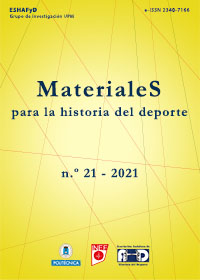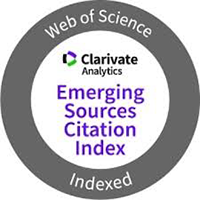Sports and hermeneutic axiology. Methodological guidelines for research
DOI:
https://doi.org/10.20868/mhd.2021.21.4505Keywords:
hermeneutics, interpretation, understanding, sports axiology.Abstract
This article aims to define a set of theoretical and practical principles on the use of the contextualized hermeneutic methodology in the axiological field of sport. The word hermeneutics comes from the Greek -ἑρμηνεύειν- which means “to interpret, explain or translate”. We will start from the assumption that we human beings cannot live without the values’ existence, we must position ourselves in an axiological way. By applying hermeneutics to the theory of sport’s values, it will help us to critically understand the procedures of vital rationality, enable understanding, and also the historical transmission, which will make us capable of coming up with new theoretical foundations for the analysis of human relationships. In our study, we intend to go deeper into the field of theoretical significance, a fact that will lead to a turnaround in traditional research, especially in the context of communicative works. The main purpose of the study must be to open up the dialogic need for new ways of understanding the meaning of reality as something diverse and complex. As main conclusions, we believe that the application of a hermeneutic methodology will enable us to get into the question of historical time and the relationship between history and time where the confrontation between the past and the future, or between experience and expectation, is situated. All this will allow us to achieve the recovery of the interpretative capacity, something that will give a scientific basis to all the studies referred to as sport values.
Downloads
References
Amilburu, M. G. (2008). “La cultura como texto. Hermenéutica y educación”. En Cultura, Hermenéutica y Educación, editado por J. Esteban, 105-18. Valladolid: Universidad Europea Miguel de Cervantes-CEINCE.
Arendt, H. (2018). La condición humana. Barcelona: Paidós.
Arranz, J. (2012). Futbol i religió. Dimensió simbòlica i pedagògica. Tesis doctoral, Departament de Teoria i Història de la Educació, Universitat de Barcelona. https://www.tdx.cat/handle/10803/53591.
Bauman, Z. (2007).Los retos de la educación en la modernidad líquida. Barcelona: Gedisa.
Corriente, F. y J. Montero. (2003). Citius, Altius, Fortius. El libro negro del deporte. Logroño: Pepitas de calabaza, 2011. Duch, L. y J. C. Mèlich, Escenaris de la corporeitat. Antropologia de la vida quotidiana. Barcelona: Publicacions de l’
Abadia de Montserrat.
Esteban, J. (2008). “Reflexibilidad hermenéutica en educación”. En Cultura, Hermenéutica y Educación, editado por J. Esteban, 45-56. Valladolid: Universidad Europea Miguel de Cervantes-CEINCE.
Fernández, J. 2006. “Historia conceptual, memoria e identidad (I)”. Revista de libros, n.º 111. https:// www.revistadelibros.com/articulo_imprimible.php?art=2795&t=articulos
Frankl, V. 2019. El vacío existencial. Barcelona: Herder.
Fullat, O. 1997. Antropología filosófica de la educación. Barcelona: Ariel.
Gadamer, H.-G. 1995. Verdad y método. Salamanca: Sígueme.
Garoz, I. 2014. Juegos y Deportes. Servicio de publicaciones Universidad Autónoma de Madrid, 2005. Heidegger, M. El ser y el tiempo. México: Fondo de Cultura Económica.
Huizinga, J. 1957. Homo Ludens. Buenos Aires: Emece Editores.
Jeu, B. 1988. Análisis del deporte. Barcelona: Ediciones Bellaterra.
Lanceros, P. 2006. “Reinhart Koselleck, filósofo dedicado a la historia semántica”, elmundo.es, 10 febrero 2006, https://www.elmundo.es/elmundo/2006/02/09/obituarios/1139474381.html (consultado el 29 diciembre 2020).
López, F. y E. Isidori. 2018. “El origen deportivo de la democracia. Una aproximación filosófica”. Movimento 24, n.º 2 (2018): 495-508.
Lüschen, G. y K. Weiss. 1979. Sociología del deporte. Valladolid: Editorial Miñón.
Marqués, A. 2001. L’hermenèutica filosòfica contemporània. A Qüestions de Vida Cristiana. Fe i Interpretació. Barcelona: Publicacions de l’Abadia de Montserrat.
Olivera-Betrán, J. y X. Torrebadella-Flix. 2015. “Del sport al deporte. Una discusión etimológica, semántica y conceptual en la lengua castellana”. Revista Internacional de Medicina y Ciencias de la Actividad Física y del Deporte 15, n.º 57 (2015): 61-91.
Pagès, A. 2005. “Bases hermenèutiques de l’educació. Vers una lectura pedagògica de H.G. Gadamer”. Temps d’Educació, n.º 29 (2005): 167-188.
Pagès, A. 2006. Al filo del pasado. Filosofía hermenéutica y transmisión cultural. Barcelona: Herder.
Ricoeur, P. 2003. Teoría de la interpretación. Discurso y excedente de sentido. Madrid: Siglo XXI.
Ricoeur, P. 2010. La memoria, la historia y el olvido. Madrid: Trotta.
Ruedas, M., M. Ríos y F. Nieves. 2009. “Hermenéutica: la roca que rompe el espejo”. Investigación y Postgrado 24, n.º 2 (2009): 181-201.
Sebastián, R. 2012. Los filósofos griegos y el deporte. La contribución de la filosofía clásica a la ética del deporte. XIX Congrés valencià de Filosofia. València: Facultad de Filosofia.
Séneca, L. A. 2010. Sobre la tranquilidad del alma. Madrid: Alianza Editorial.
Spaemann, R. 2005. Ética, cuestiones fundamentales. Pamplona: Eunsa.
Terricabras, J. Mª. 2002. I a tu, què t’importa. Els valors, la tria personal i l’interès col·lectiu. Barcelona: Edicions la campana.
Turró, G. 2010. Humanisme i esport, proposta d’una axiologia pedagògica. Tesis doctoral, Departament de Teoria i Història de la Educació, Universitat de Barcelona.
Turró, G. 2011. “Esport, educació i valors, una proposta humanística”. Temps d’Educació, n.º 40 (2011), 263-78
Vaccarili, A. 2008. Por una hermenéutica educativa a través de la literatura en los diversos contextos del planeta. A Cultura,
Hermenéutica y Educación. Valladolid: Universidad Europea Miguel de Cervantes.
Vázquez, M. E. 2003. “Reseña de ‘Futuro pasado’ de Reinhart Koselleck”. Relaciones. Estudios de historia y sociedad
XXIV, n.º 95 (2003): 300-5. https://www.redalyc.org/pdf/137/13709512.pdf
Vilanou, C. 2006. “Historia conceptual e historia intelectual”. Ars Brevis, n.º 12 (2006): 165-90.
Vilanou, C. 2008. “Humanismo, formación y hermenéutica. La memoria a priori pedagógica”, en Cultura, Hermenéutica y Educación, coordinado por Joaquín Esteban Ortega, 73-87. Valladolid: Universidad Europea Miquel de Cervantes.
Downloads
Published
Issue
Section
License
Authors who submit to this journal agree to the following terms:
- Author(s) keep copyright and guarantee to the journal the right to be the first publication of the work as licensed under Creative Commons Attribution-Noncommercial-ShareAlike 4.0 International as initial publication in this journal.
- Author(s) can establish additional agreements for non-exclusive distribution of the version of the work published in the journal (for example, to an institutional archives or to publish it in a book), with an acknowledgment of its initial publication in this journal.
- It is allowed and authors are encouraged to disseminate their work electronically (e.g, in institutional open archives or on their own website) before and during the submission process, as it can lead to productive exchanges, as well as a citation earlier and more of published work (See the Effect of Open Access).










